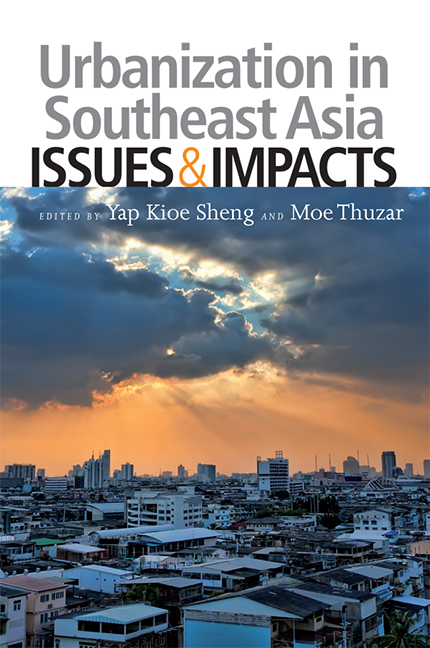Book contents
- Frontmatter
- Contents
- Message from Head, ASEAN Studies Centre
- Message from Director, Centre for Liveable Cities
- About the Contributors
- Introduction
- Urbanization in Southeast Asian Countries: Recommendations
- 1 The Challenges of Promoting Productive, Inclusive and Sustainable Urbanization
- Cities as Engines of Development
- Inclusive Cities
- Cities and the Environment
- Governance, Decentralization, and Urbanization
- Urbanization from an ASEAN Perspective
- Index
Introduction
Published online by Cambridge University Press: 21 October 2015
- Frontmatter
- Contents
- Message from Head, ASEAN Studies Centre
- Message from Director, Centre for Liveable Cities
- About the Contributors
- Introduction
- Urbanization in Southeast Asian Countries: Recommendations
- 1 The Challenges of Promoting Productive, Inclusive and Sustainable Urbanization
- Cities as Engines of Development
- Inclusive Cities
- Cities and the Environment
- Governance, Decentralization, and Urbanization
- Urbanization from an ASEAN Perspective
- Index
Summary
It is not easy to identify challenges common to the cities and towns of Southeast Asia as the region is diverse in demographic, economic and sociocultural terms. All Southeast Asian countries strive for better standards of living and sustainable livelihoods, but the urban scenarios across the region require different prescriptions for their development goals. However, ASEAN member states are also moving towards regional and economic integration by improving connectivity between existing and potential centres of economic activity. This will have immense repercussions for urbanization and urban development in the member states.
To assist policymakers address these challenges, the ASEAN Studies Centre at the Institute of Southeast Asian Studies (ISEAS) and the Centre for Liveable Cities (CLC) of Singapore organized a series of regional workshops on urbanization in Southeast Asian countries from December 2009 to July 2010 to:
• Provide opportunities for ASEAN countries to learn from one another by sharing information and exchanging good practices;
• Assess the preparedness of countries in the region for an increasingly urban future; and
• Discuss and recommend options on how regional cooperation could assist national and sub regional efforts in addressing urbanization issues.
The workshop discussions helped to identify urbanization issues that ASEAN member states could address at national and regional levels. The recommendations that resulted from the discussions were submitted in the form of a preliminary report to relevant ASEAN ministerial and senior officials meetings and the ASEAN Summit. These recommendations now appear in this book together with papers presented and discussed at the regional workshops.
The authors contributing to this book have tried to go beyond an analysis of a particular set of urban challenges within one city or one country, and instead have drawn conclusions and lessons for all the countries of the region. In the opening chapter, Yap Kioe Sheng provides an overview of the urban challenges that Southeast Asian countries face. He summarizes the key challenge as “to promote urban economic growth, while reducing urban (and rural) poverty and protecting the local, national, regional and global environment”. Another challenge he identifies is enabling a more effective and efficient delivery of urban services through decentralization and privatization, when many local governments lack the capacity (and willingness) to use measures for the benefit of the city as a whole. Capacity development and good governance are critical to making urban areas productive, inclusive, and sustainable.
- Type
- Chapter
- Information
- Urbanization in Southeast AsiaIssues and Impacts, pp. 1 - 7Publisher: ISEAS–Yusof Ishak InstitutePrint publication year: 2012



